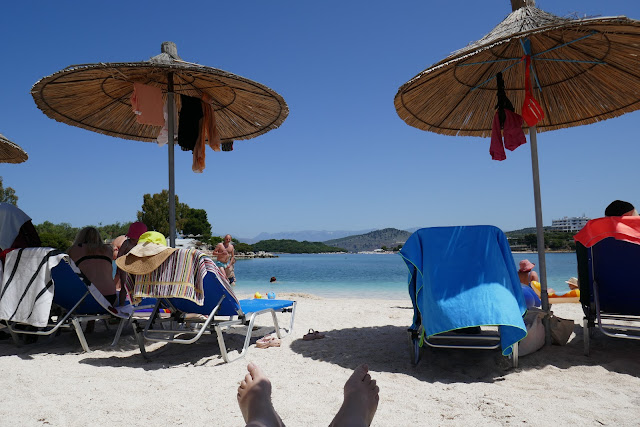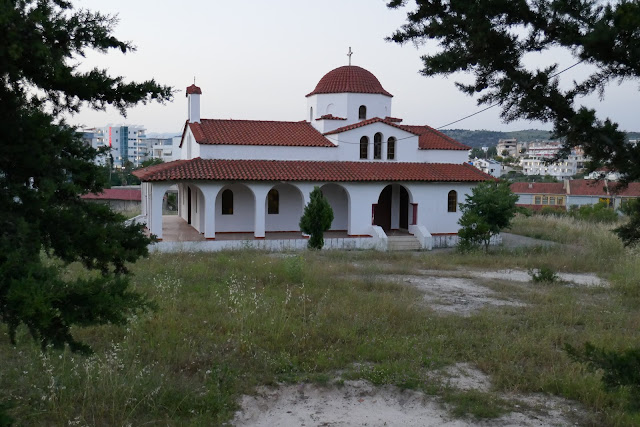The Ferry from Corfu and a Stress Free Introduction to Albania
06-June-2019
Corfu to Saranda Ferry and on to Ksamil
After breakfast we trundled our cases through the whole length of the ferry port..
 |
| Trundling our suitcase through Corfu ferry port |
The port is busy, passenger and car ferries leave for various Greek islands and cities, including Athens via the Corinth Canal, for Barri and Brindisi in Italy, and for other destinations. Saranda in Albania was the only route going outside the Schengen Area, so we had to make our way to customs and passport control in the port’s farthest, darkest corner.
The formalities were straightforward and we left on time at 9am.
 |
| Leaving the dock, Corfu |
The strait between Corfu and Albania narrows to a little over 2km, but Corfu City to Saranda is nearer 20km, a journey the hydrofoil completes in under the hour.
 |
| Corfu to Saranda |
We headed north along the coast of Corfu...
 |
| The hazy coast of Corfu |
...and once beyond its northernmost point we were almost immediately entering the bay of Saranda, the blue sea surrounded by a horseshoe of green hills. Saranda’s white buildings have crept ever further upwards as the town has developed as a holiday resort.
 |
| Entering Saranda |
 |
| Albania |
 |
| Disembarking at Saranda |
We were met by a driver who took us to the smaller resort of Ksamil, 15km to the south. Ksamil lies on a peninsula (see map above), the body of water on the landward side being called ‘Lake’ Butrint, though the water is brackish and has an outlet to the sea - like a Scottish sea loch, only blue. We drove several miles along the beautiful lakeside, passing numerous mussel beds.
Ksamil, First Steps
We reached Ksamil, turned off the main road and drove through and almost out of town before reaching the Hotel Luxury.
 |
| The Hotel Luxury, Ksamil |
The friendly receptionist checked us in immediately, offered us a second breakfast and gave us a room with a balcony overlooking Paradise Beach – one of many in Ksamil.
 |
| Paradise Beach, Ksamil from our balcony |
We were not seriously tempted by a second breakfast, but coffee and a cake seemed appropriate, by Greek time if not Albanian.
Needing money, we asked the receptionist about an ATM. There were two in Ksamil, she told us, opposite each other on the main road a twenty-minute walk away.
Strolling back through the small town was pleasant and gave us an opportunity to check out the restaurants. Albania may not be the poorest country in Europe, Moldova (we visited last year) and Ukraine vie for that honour, but it is only a little richer. The streets of Ksamil did not look particularly prosperous, but neither did they look poverty stricken; the shops and the state of the road and buildings reminded us of the Algarve thirty years ago – an impression reinforced by the prickly pears and bougainvillea.
 |
| The streets of Ksamil (photographed next day, but they don't change much) |
Outside our chosen ATM was a rosemary hedge. In less affluent countries ATMs usually have a security guard, often they are elderly, eking out whatever pension they may or may not have. Rarely do they look the sort of person you would find reassuring in the event of a violent mugging, but as they seldom, if ever, have to do anything it hardly matters.
 |
| Central Ksamil - the ATM is on the main road 10m behind the camera |
The very typical security guard saw us put our hands into the hedge. He smiled and made plucking and rubbing gestures, but there was no need we were ahead of him and the savoury fragrance of rosemary accompanied us into the ATM booth. As we emerged a few minutes later equipped with tens of thousands of lek (Albania is a cash economy and £1 buys 140 lek) the guard approached us and presented Lynne with a sprig of rosemary he had cut for her.
We had not known what to expect in Albania. Thirty years ago it had been as isolated as North Korea (we visited there in 2013), the first decade of democracy was blighted by a pyramid selling scandal which cost Albanian citizens US$1.2 billion (an average of $400 each) and led to the brink of civil war, and the only Albanians who make the news at home are involved in organised crime. On the other hand, the taxi driver who brought us to Ksamil was smiley and welcoming, the hotel receptionist had been friendly and helpful and now a security guard, a man old enough to have been an adult under the repressive regime of Enver Hoxha, was giving us a present. The real Albania was turning out to be a delight [and remained that way for the rest of our stay]
On the way back we bought a bottle of ouzo, not very Albanian maybe, but Greece was close by, it was readily available (which it isn’t at home), it was cheap (which it isn’t at home) and we had the perfect balcony for drinking ouzo in evening sunshine.
oo000oo
06-June-2019 and 07-June-2019
An hour by hour account of our activities in a resort designed for inactivity would be dull, so here are the memorable bits.
Light Lunches
We had two lunches, one a Greek style snack in a beach café where a bottle of Tirana beer (a competent if uninspiring ‘pilsner’) cost 300 lek, the other a shared pizza in town where beer cost half as much.
 |
| A snack and a beer, Paradise Beach, Ksamil |
On the Beach
We indulged in the obligatory lounge on the beach, surrounded by Russians…
 |
| Lynne's toes and some Russians, Lori Beach Ksamil |
…and I went for the equally obligatory swim. I must admit that in recent years I have become a warm water swimmer, happy enough ploughing up and down a lane at Stone Leisure Centre or wallowing in the balmy waters off Langkawi, but I have not seriously threatened the wet end of an Algarve beach in the last three or four visits. The Mediterranean looked invitingly clear and blue, but this early in the season it was not particularly warm. Waist deep, I found the cold uncomfortable and I was unsure whether to continue. ‘You have nothing to prove,’ I told myself.
 |
| Shall I have a swim, or hail that taxi? Lori Beach, Ksamil |
At that point friend and former colleague Anne swum into my mind’s eye. Earlier this year her daughter travelled to Murmansk as part of the British team for the world ice swimming championships (and yes, that does say ICE swimming). Anne went along for the ride - only she went ice swimming too and even took part in a competition (she appears in this You Tube video). Ice swimming is obviously barmy, but it is a magnificent barmy and if Anne can swim in an ice hole, surely I can manage the Mediterranean.
 |
| Easy really, Lori Beach, Ksamil |
Yes of course I can, and it was pleasantly warm once I had taken the plunge.
A Short Walk out of Town
We admired the Albanian habit of putting colourful pots of colourful plants along walls and, in this case, up stairs...
 |
| Colourful pots, colourful plants |
...and took a walk up the little road out of town, where we were greeted by every one of the locals we passed. We went far enough to look back over Ksamil.
 |
| Ksamil |
The road was lined with farms and small-holdings. Some of the dwellings looked basic, and farming methods antiquated….
 |
| I have not seen hay in stooks like that for many years, Ksamil |
…while other had large and prosperous looking houses…
 |
| A more prosperous looking farmhouse, Ksamil |
…and strutting, self-appointed guardians.
 |
| Guard hen, Ksamil |
Ksamil Mosque and Orthodox Church
On our way back we heard a call from the mosque. We did not search for Ksamil’s mosque but we did catch a glimpse as we went for dinner. It has a pencil slim minaret, typical of the Balkans.
 |
| Minaret and dome of the Ksamil mosque |
Nearby is the Greek Orthodox church. Enver Hoxha tried to make Albania an atheist state, in the 1970s all places of worship were closed and practicing religion was a punishable offence. The current democratic constitution permits freedom of religion and the secular government stays out of religious matters. In the 2011 census 58% said they were Muslim, 17% Christian (10% Catholic, 7% Greek Orthodox) and the rest non-religious. These figures probably underestimate the Greek Orthodox population which may be double the census figure. Here in the south, many people are of Greek descent and the Orthodox Church is particularly strong. Either way, 68% of Albanians say their religion, if they have one, is not particularly important in their lives.
 |
| Greek Orthodox church, Ksamil |
Dinners in Ksamil, Octopus and Mussels
Both evenings, after a glass of ouzo on the balcony, we set off about 8 o’clock to find a restaurant for dinner. On the way we paused to watch the sun set into the Mediterranean.
 |
| A Ksamil sunset |
The first evening we dined on octopus, the tender, mild flavoured tentacles grilled to perfection…
 |
| Grilled octopus and mixed salad, Ksamil |
…and on the second, mussels like those we had spotted earlier growing in Lake Butrint. The local method is to cook them in the oven. The sauce is based on wine, herbs and garlic, like moules marinière (no, moules marinière does not involve cream, regardless of what Rick Stein, Raymond Blanc and any other culinary luminary may say*) though with the addition of green peppers and a little tomato. Mussels and sauce were both excellent.
 |
| Mussels, Albanian style, Ksamil, (I should point out this is a dish for two) |
Albanian cuisine has three main influences, Italian (our pizza lunch, the balsamic dressing on the salads) Balkan (grilled meats predominate inland) and, particularly here, Greek (Tzatziki and feta are ubiquitous). I love baklava and had just enough space after the mussels. It was a great disappointment, dry and overcooked, but whether that was the restaurant or the way Albanians eat their baklava I do not know.
Wine was a little disappointing too, no wine lists, just carafe wine - a litre is too much, half a litre too little – but cheap enough and Italian in origin.
Not a disappointment was raki, the appropriate end to every Albanian dinner. Usually distilled from grapes (other fruits can be used) it is a colourless spirit that hovers somewhere between regular brandy and pomace brandies (marc/grappa/bagaceira etc). It has a rough, raw, alcoholic flavour and is usually sold at 40% (higher is possible, particularly in the homemade versions). The regulation 5cl measure (a British ‘double’, though a British single is merely a wet glass) is available in every restaurant for around 70p. We loved it.
*I refer you to Larousse Gastronomique as the ultimate authority
Albania
Part 1: Ksamil on the Albanian Riviera
Part 2: Butrint and the Blue Eye
Part 3: Gjirokastër
Part 4: Berat
Part 5: Tirana
Part 6: Tirana to Saranda
+
Corfu City
No comments:
Post a Comment